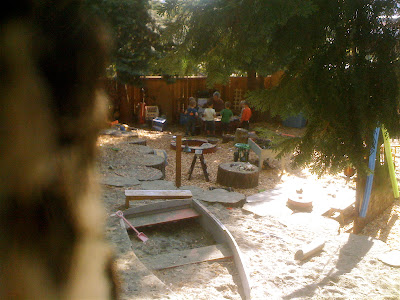The only time during our school day that we expect all the children to convene together is at circle time: 15-30 minutes during which we come together and practice being in a group, raising our voices together, engaging in discussion, making decisions, telling stories. It's hard for some of the children, I know, taking turns talking, listening to the other children, sitting in a way that doesn't block the views of other kids, keeping our hands to ourselves.

There are some play-based educators who treat their circle times as optional, allowing those who chose not to participate to engage in their own pursuits elsewhere. I get that and have toyed with the idea myself, but have never pulled the trigger because I worry that something important about community building, about democracy, will be lost when some opt out. One of the principles of
democratic free schools is that the children are free to pursue their own interests. There are not even classes, unless organized by the students themselves, but meeting attendance is mandatory. I have always thought of our circle times as community meetings and without them, without full participation, I worry that something vital about
us will never be discovered: children may always opt out of an activity, but I just can't bring myself to give children the opportunity opt out of
us.
Of course, I don't command the children to sit on our checker board rug, but I do make my opinion clear: "It's circle time. You have the whole day to play with toys. Now is when we share our time."
When children begin to talk out of turn, I say, "I can't hear everyone at once. If you raise your hand, you'll get a turn for everyone to hear you."
When children stray away from the rug one of our parent-teachers shadows them, softly reminding them, "That's closed," until they come to the books. If they would prefer to quietly flip the pages, that's an option, but one that rarely holds a child's interest, especially when we are getting things done.
I generally start things off by asking, "What do we need to talk about?" then turn it over to them. In my role of moderator or facilitator, it's my job to keep things moving, of course, to keep things engaging, to not get bogged down, to make sure everyone gets a turn, to avoid lecturing, to keep in mind that this is their circle time, all without making it a kind of torture for those who need to think with their entire bodies in motion, which is why there is usually a lot of "up and down" involved in a typical Woodland Park circle time.
By the time most kids are 4, if they've been with us for the first couple years (and most have), they get circle time. Not that they "behave" perfectly, of course, but then again I've rarely been in an adult meeting when there isn't some cutting up, some shouting out, some speaking out of turn, some getting up to go to the bathroom, to get a drink or a bite, to take a call, or to pace the hallway. No, when I say they "get it," I mean that they know what we're doing is an important part of who we are, not necessarily intellectually, but at a deeper level, having internalized both the joy and importance of all of us doing something, anything, together.
Best of all is when you begin to see the children during the rest of the day, when the toys are all "open," when we aren't "expected" to take turns or raise hands, when we aren't on the checker board rug, but rather out there in the wider world of the whole school, they gather around and engage productively together. You see them using the skills we've been practicing at circle time, coming together around something they all care about, or are curious about, taking turns, making space for one another, sometimes even spontaneously raising hands. This is how democracy is supposed to work. This is how community is built.

And this is why we still do circle time. Not because we need children to practice being in meetings, but rather because there are certain skills required to build a democratic community, skills based in fairness and empathy. When they gather round the workbench or art table and organize themselves, especially in large groups, when I can step back and watch them go, these are perhaps my proudest moments as a teacher. That's when it's no longer about my expectations, but rather it's about theirs, which is the point of why we gather around.
******
If you liked reading this post, you might also enjoy one of my books. To find out more, Click here! "Ready for a book that makes you want to underline and highlight? One that makes you draw arrows and write 'THIS!!!!!' in the margin? Then you are in for a treat." ~Lisa Murphy, M.Ed., author and Early Childhood Specialist, Ooey Gooey, Inc.